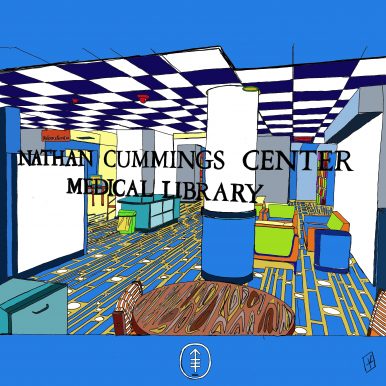 In early March 2020, the MSK Library closed its physical space and with little planning moved to virtual services only. Our world changed, both personally and professionally. Our work and the way we delivered services had to be reassessed for health and safety reasons. Simple requests, like a user borrowing a book, needed additional planning. Thankfully, we started years ago to curate and build a digital collection to accommodate researchers, clinicians, nurses, and support staff located at all MSK locations, not just staff based at main campus. In addition, our social media and web presence provided ways to connect with our users and Library staff took advantage of available videoconferencing tools to provide one-on-one consultations. Then in October, under specific guidelines, we were able to partially reopen the library’s space on Mondays and Thursdays.
In early March 2020, the MSK Library closed its physical space and with little planning moved to virtual services only. Our world changed, both personally and professionally. Our work and the way we delivered services had to be reassessed for health and safety reasons. Simple requests, like a user borrowing a book, needed additional planning. Thankfully, we started years ago to curate and build a digital collection to accommodate researchers, clinicians, nurses, and support staff located at all MSK locations, not just staff based at main campus. In addition, our social media and web presence provided ways to connect with our users and Library staff took advantage of available videoconferencing tools to provide one-on-one consultations. Then in October, under specific guidelines, we were able to partially reopen the library’s space on Mondays and Thursdays.
While we were delighted to reopen, the COVID-19 pandemic impacted the way we worked and supported our users. Given everything we have gone through, there is an opportunity to reexamine how we interact with clients, support the end-user experience, and perhaps seek new ways to deliver content, resources, and services.
This year we are embarking on a project to gather information from our user community (current and new hires) regarding our existing services and we plan to take time to imagine what else we could do to support the research and medical activities of the Center. I am very excited to work with my team to gather feedback from user polls and surveys, as well as organized focus group sessions and one-on-one interviews. The feedback we collect will form the basis of a strategic plan to help us chart the future of the MSK Library.
If you are interested in sharing your thoughts, please don’t hesitate to contact me. Let the conversations begin!
Donna Gibson
Director of Library Services